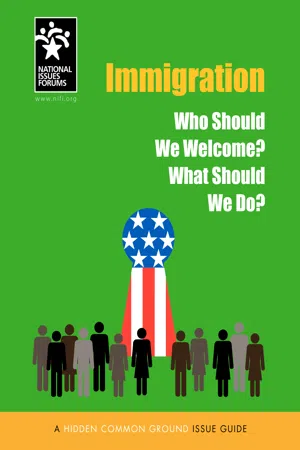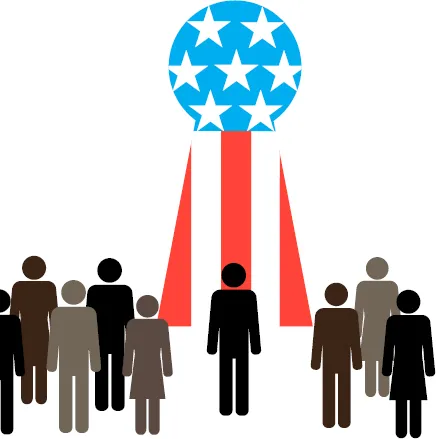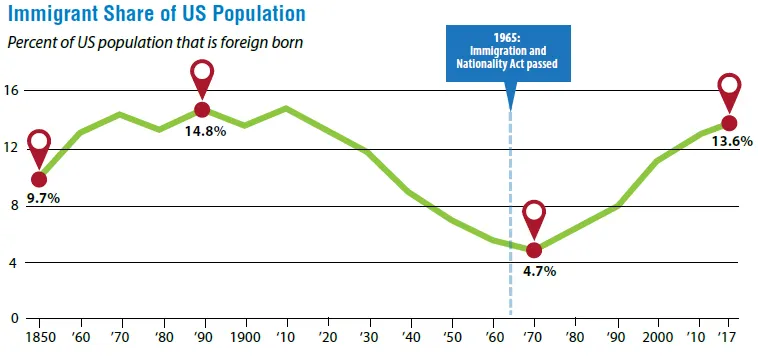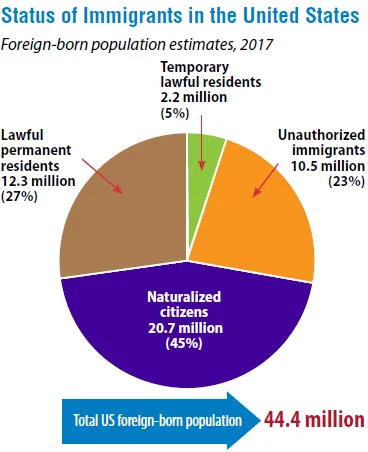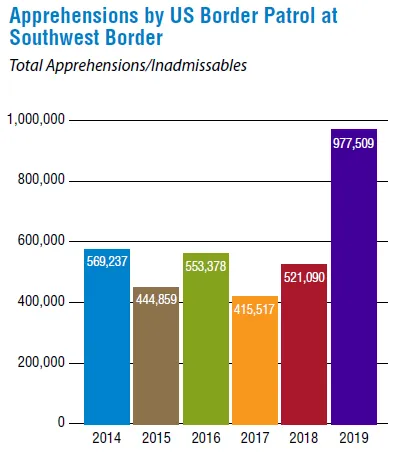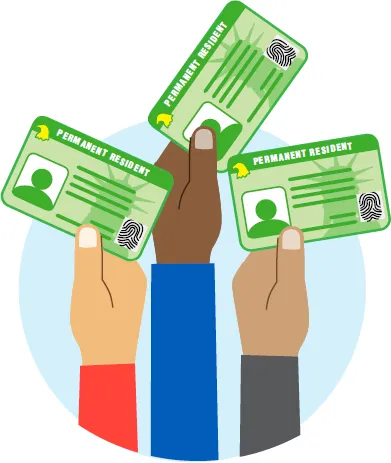![]()
Immigration
Who Should
We Welcome?
What Should
We Do?
FOR CENTURIES, people from other countries have come to the United States in search of a better life. The steady influx of newcomers helped build the US, creating a mix of cultures, religions, and ethnicities not found anywhere else in the world. Today, people born in another country make up almost 14 percent of the US population.
Before the pandemic overshadowed most other concerns, many people were asking questions about this country’s immigration policies, brought to their attention by the recent crises on our southern border and the sharpening debate over border wall construction. As we begin to think about what changes we may want to make, it’s helpful to consider where we are now:
How many immigrants are coming into the United States?
Over the last decade, the United States legally accepted about one million immigrants a year. That number was already projected to drop under new policies—put in place before the pandemic border closures—that ban travel from about a dozen countries, cap the number of refugees we will accept, and bar those who will need public benefits.
How do we choose who is admitted now?
Currently, roughly two-thirds are admitted because they have family members already here. Of the remaining third, about half are admitted based on their job skills and half are refugees from political or religious persecution. There is a backlog of 3.6 million people waiting to have their immigration applications evaluated and processed.
Has the share of population that is foreign born increased?
In 1970, slightly less than 5 percent of the US population was foreign born; today, it is about 13.6 percent.
How many undocumented immigrants live in the United States?
An estimated 10.5 million people now living in the United States entered without permission, typically crossing the border illegally or staying here after their visas have expired. Many have lived in the United States for decades and have spouses and children who are US citizens.
Who are the “DREAMers”?
About 690,000 young people, sometimes known as the “DREAMers,” were brought to the United States as children, many as infants or toddlers. A government program called Deferred Action for Childhood Arrivals (DACA) granted them temporary legal status, but that program continues to be at issue.
How has the coronavirus pandemic affected immigration?
Shortly after the first US cases of COVID-19 were reported, the United States closed land borders to nonessential travel, suspended asylum programs, and “paused” processing for those seeking work visas, all but shutting immigration down. The pandemic also has affected immigrants already in the United States. An estimated six million immigrants worked on the front lines of the coronavirus response, in hospitals, in meat-processing plants, and on farms.
Behind all these numbers is a maze of complicated quotas, shifting criteria, and unknowable timelines. The average wait time for a “green card”—which allows permanent legal residence—is about six years. But a family member from the Philippines or Mexico, countries that have millions of applicants, could wait 20 years. In the employment category, someone from India who arrives in the United States on a temporary-worker visa today faces an astonishing 50-year wait for permanent status.
The immigration issue affects all Americans in one way or another. With US birthrates falling, American companies have long experienced a shortage of both high-skilled professionals and low-wage workers. And, while some communities are thriving with large immigrant populations, others question whether their communities will be able to assimilate a growing share of newcomers. These and other challenges raise pressing questions about the nation’s immigration policies:
■Should we reduce the number of immigrants legally admitted into the United States each year? If so, what should we do about worker shortages?
■How should we handle undocumented immigrants in a way that is humane but also fair to the millions who are waiting to enter legally?
■Does the current flow of newcomers compromise our sense of national unity or instead build on a rich history of diversity?
■Does the United States have a humanitarian responsibility to take in refugees whose lives are in danger? How many can we realistically accommodate?
This issue guide offers a framework for considering the priorities that should inform our nation’s immigration laws. It presents three options for moving forward, each based on a different way of looking at the issue and each with a different set of prescriptions about what should be done.
None of these options is more “correct” than the others, and each option has trade-offs, risks, or drawbacks that need to be considered if we are to build a fair immigration system that reflects what we hold most valuable.
![]()
Option 1:
Welcome
Immigrants;
Be a Beacon
of Freedom
THIS OPTION SAYS THAT IMMIGRATION HAS HELPED MAKE THE US WHAT IT IS TODAY—a dynamic and diverse culture, an engine of the global economy, and a beacon of freedom around the world. It says that part of what defines us as a nation is the opportunity for all to pursue the American dream. We should develop an immigration policy that builds on that tradition by welcoming newcomers, helping immigrant families stay together, and protecting those fleeing war and oppression.
Welcoming immigrants is the right thing to do, according to this option, and it benefits our culture and our economy. The immigration system should be one that reflects the decency and compassion of our nation. Families should stay t...
